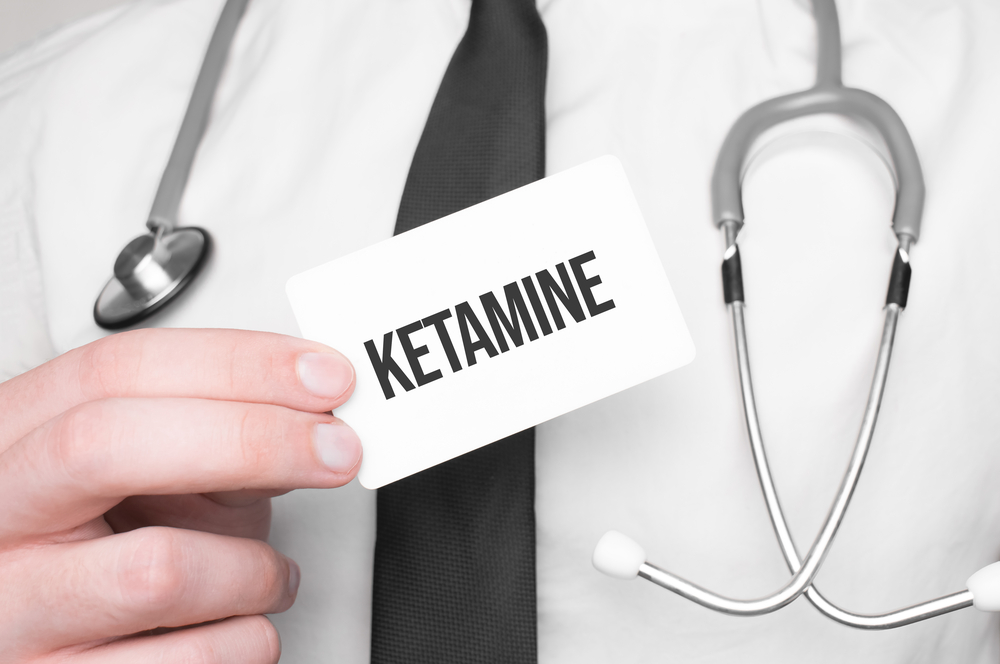In a new study from Stanford University, when researchers compared intravenous ketamine to an active placebo, the supposed rapid antidepressant effect of ketamine disappeared. The drug failed to beat the placebo for treating depression.
“A single dose of intravenous ketamine compared to placebo has no short-term effect on the severity of depression symptoms in adults with major depressive disorder,” the researchers write.
Additionally, one patient died of a heart attack in the ketamine group, although this was considered unrelated to the ketamine infusion.
The article was posted before peer review on the preprint server medRxiv.org.
 The benefit of ketamine, according to its proponents, is that it has a rapid but transient antidepressant effect—an effect noticeable within hours of use and which peaks within a few days before declining.
The benefit of ketamine, according to its proponents, is that it has a rapid but transient antidepressant effect—an effect noticeable within hours of use and which peaks within a few days before declining.
However, ketamine has many effects that make it challenging to do a genuinely blinded trial, such as dizziness, nausea, and dissociative states. Because of these effects, patients are easily able to guess whether they are actually receiving ketamine or not. Thus, some researchers have suggested that the placebo effect is responsible for much of the improvement seen in the clinic.
To gain a clearer picture of the drug’s effects, an active placebo must be used—a drug that causes similar side effects but doesn’t have the same proposed antidepressant properties. In this case, the researchers used surgical anesthesia as the active placebo. (Ketamine itself is an anesthetic drug.)
The researchers, led by Theresa Lii and Boris Heifets at Stanford University, recruited 40 participants (70% female; 65% white), all of whom were experiencing a diagnosed episode of major depression for at least a month. They were gathered from people who were going to undergo surgery, which allowed the researchers to give them the anesthetic as an active placebo. During surgery, all participants were given standard surgical anesthetic; half were randomly assigned to receive ketamine.
The study was triple-blinded, meaning that none of the participants, anesthesiologists, or researchers knew whether the participant was given ketamine or not until after the study.
The researchers then followed up with the participants at 1 day, 2 days, and 3 days afterward, as well as later time points (5, 7, and 14 days) for other analyses. The primary outcome was a change in MADRS depression score (a 60-point scale); the secondary outcome was clinical response on the MADRS; other outcomes included remission rates on the MADRS, HADS score (a 42-point anxiety and depression self-report scale), pain intensity, and opioid use.
On the primary outcome of change in depression severity, there was no significant difference between groups at any time point. No matter how the change in MADRS score was measured (the researchers used a couple of different statistical methods), those who received ketamine did not improve any more than those who received the placebo.
“Depression scores at 1, 2, and 3 days post-infusion did not differ between trial groups,” the researchers write.
On the secondary outcome, response to treatment (defined as a 50% reduction in MADRS score), 60% of those who received ketamine (12 people) met this criterion after 1 day, compared to 50% of those who received placebo (10 people). But by day 2, more people in the placebo group had “responded” to treatment: 60% in the placebo group compared to 50% in the ketamine group. On day 3, the placebo group continued to do better: 50% “responded” compared to 45% in the ketamine group. This continued; even at 14 days, the placebo group had 57.9% “responded” compared to 42% in the ketamine group.
In terms of remission—no longer meeting the criteria for depression—ketamine actually did far worse than placebo. Just one week after receiving a placebo, more than half of the patients (57.9%) no longer had depression, compared with less than a third (31.6%) of those who received ketamine.
At day 1, 50% of those in the ketamine group were classified as “in remission” versus 35% of those in the placebo group. However, this difference also disappeared quickly, and by day 3, both groups had a 40% “remission” rate. By the end of a week, the placebo group had 57.9% of patients in remission, compared to just 31.6% of those who received ketamine. By 14 days, the placebo group was still doing better: 47.4% in remission compared with 42.1% who received ketamine.
Opioid consumption, pain intensity, and HADS scores were also not significantly different between groups.
“Secondary and exploratory outcomes also found no evidence of benefit for ketamine over placebo,” the researchers write, adding:
“Our results suggest that ketamine may actually be ineffective for the short-term treatment of MDD.”
The researchers suggest that the placebo effect (which they refer to as “expectancy bias”) may be responsible for the supposed powerful antidepressant effects of ketamine. They argue that future research must use active placebos in order to detect whether the drug is actually doing something effective, particularly for drugs like ketamine that have obvious side effects.
“While it is impractical to use surgical anesthesia for most placebo-controlled trials, future studies of novel antidepressants with acute psychoactive effects should make stronger efforts to mask treatment assignment to minimize the effects of subject-expectancy bias.”
In an article in late 2022, researchers wrote that ketamine for depression poses a “significant risk to the public” due to poor evidence of efficacy and many safety concerns. Ketamine does not have FDA approval for treating depression and is used “off-label.” Ketamine variant esketamine, which was approved by the FDA in 2019, failed to beat the placebo in five of its six clinical trials.
Ketamine has also been associated with suicide deaths; in one recent study, it failed to beat a placebo for reducing suicide attempts, and one person died by suicide after taking the drug. Another person died by suicide in a 2016 open-label study that included only 12 people, and another patient was hospitalized after expressing suicidal intent.
****
Lii, T. R., Smith, A. E., Flohr, J. R., Okada, R. L., Nyongesa, C. A., Cianfichi, L. J., . . . & Heifets, B. D. (2023). Trial of ketamine masked by surgical anesthesia in depressed patients. medRxiv.org. Published on May 1, 2023. https://doi.org/10.1101/2023.04.28.23289210 (Link)















This study design highlights the arrogance and ignorance of the medical community. Ketamine, psilocybin, and MDMA alone do nothing without proper set, setting, preparation, and facilitator attunement. the MAPS (Multidisciplinary Association for Psychedelic Studies) researchers spend two 90 minute opening-up sessions before scheduling a full day to experience the medicine. At this time, two trained professionals “sit” with the patient and help them process emotions, memories, and trauma. The substances open up the neural pathways, inhibit habitual patterns, and increase neuroplasticity. In this state, the client can understand the existential beliefs and held patterns that are causing their symptoms of depression. The substance is just a tool to help the mind process and will do little without proper guidance. The MAPS guidelines also include several integration sessions with a therapist in the weeks following the experience with the medicine. I have had excellent results with Ketamine for complex PTSD. It the altered state, I have been able to process- with the help of a trained facilitator- deeply held self criticism as well as gain understanding surrounding generational trauma and dysfunction in my family of origin. That is what cures depression.
Had I been signed up for this study, firstly knowing I’d only have a 50% chance of getting the real medicine, and secondly just sitting it out on my own with no guidance or process work in a sterile environment… I’d have lilley had no benefit either. Not to mention a few impersonal questionnaires for follow-up. It’s sad that studies like this miss the whole point of psychedelic assisted therapy.
Report comment
Which once again reinforces the idea that the person one is interacting with, their maturity, skills, openness to experience, ability to create a safe environment, ability to help a client focus on their own goals and purposes, is what really matters in any kind of “therapy” or healing practice. I find calling MDMA “medicine” in itself to be an absurdity. It is not a “medical” process you are describing, it is a spiritual/emotional/intellectual journey that is very personal to each individual, and there is no way to create a repetitive “treatment” that can obtain any kind of consistent and predictable results for all people. The key is who is helping “guide” you and what kind of “guidance” they tend to provide (empowering vs authoritarian) rather than the particular drug or other method used. This is not to say that MDMA or any other drug may not be able to contribute to increased spiritual awareness or skills in life, but it’s not “medicine,” any more than alcohol or marijuana are “medicine” because they have certain effects that a person may or may not desire or benefit from.
Report comment
Sad that this trial was not a success. I’m curious how they managed the ethics of administering it blindly with concurrent surgery…
Report comment
Why is it sad? Science is about facts, not feelings. It is GOOD that Ketamine’s rah-rah propaganda has been served a well-deserved challenge. We need to know the truth.
Report comment
Something is wrong when they are giving ketamine to people and Paxil to dogs. Anyone giving that poison to a dog should be investigated for animal cruelty.
Report comment
Did anyone ask before they did this study that having surgery can make people depressed and depressed people having surgery will probably remain depressed? If you need a study, there is this one that took me 20 seconds on Google to find: https://link.springer.com/article/10.1186/s12893-016-0120-y In an effort to avoid breaking blind, they chose a situation where the participants are all bound to be and remain depressed.
Ketamine aside, this shows an inherent problem in many studies of mental states. Being depressed or down when you are in pain or having medical difficulties is how the body is supposed to respond. This type of depression is a non-disease in search of a cure. If it isn’t a disease, you can’t cure it.
Report comment
Clearly, the most fundamental fallacy with the entire psychiatric edifice is the assumption that all people who “have depression” or whatever “mental illness” is under discussion are all ILL and have the SAME PROBLEM and need the SAME INTERVENTION. The DSM itself invalidates this assumption in its introduction, but this apparently has no impact on people’s viewing these “diagnoses” as some kind of valid scientific entity that can somehow be “researched” as such, even though the people in the study group often have little to nothing in common with each other. In fact, it’s been shown that multiple people can “qualify” for the same “diagnosis” and have not a single “symptom” in common! How it’s not obvious to anyone of a slightly scientific bent that this whole system is a house of cards built on nothing but opinion and bias is beyond my comprehension.
Report comment
That was well put. Back in my early megavitamin days, I treated a number of people who’d been told by shrinks they had “depressions” but were actually suffering from dysperceptive states, according to my Hoffer/Osmond Diagnostic test. Treating the dysperceptions with B3 and C also relieved their depressed moods.
Report comment
This study design is totally unaware of how ketamine can be successful. It’s about the experience while the drug is active. Of course, if someone is knocked out (anaesthetized) right after the infusion, there will be no experience.
I conclude that either these researchers were naïve or sought to set up ketamine for failure.
Report comment
You are 100% on point. Ketamine therapy works.
Report comment
This study is a disservice to those suffering from depression, especially what had been termed “treatment resistant decision.” One would not expect that depression would be in any way treated by one dose of antidepressants, one week or even one month. In order for ketamine to work, the patient just undergo a series of treatment (perhaps six or seven), with doses determined by the person’s weight, in a controlled environment, and guided by a doctor or other experienced guide. I generally agree with MAD’s approaches and articles that question the pharma industry’s pushing onto patients drugs that have little chance of success. In this case, a study with such a meager platform and it’s attendant results doesn’t deserve publication.
Report comment
Ketamine therapy has literally saved my life. Infusion therapy was the only thing that worked when I was laying in bed for weeks at a time, not eating, showering, etc. The infusions got me to a point that I was able to do more for myself and continue with CBT. Now I am on a very low dose ketamine therapy and my life has completely changed for the better. Good physicians, psychiatric nurses, and the setting and guidance that they provide are an invaluable part of this therapy. I’ve been through pure hell and ketamine treatment has relieved me of that. Ketamine therapy works!!
Report comment
I’m glad Ketamine therapy works so well for you! But I do want to remind you that this doesn’t mean it works for everyone. The idea that all people who are depressed have the same problem or need the same solution is not scientifically valid. I rejoice that people find Ketamine or any other approach workable for them. I just want to be cautious about using anecdotal data to extrapolate for others who may have very different circumstances and very different results than you had.
Report comment
It’s ridiculous to compare a single dose of ketamine given during an anesthetic to ketamine specifically given for therapeutic purposes in the treatment of depression. It is impossible to ignore the role that the surgical experience had on these subjects versus a mental health setting. Further, the surgery itself introduces far too many variables to view this as evidence of ketamine’s effects on depression Were these all for the same type of surgery? Were the surgical teams identical? What a joke of a “study.”
Report comment
I agree with Orrin-if you give a psychedelic/dissociative in a way that people don’t know they are having it, you’ll likely lose the effects. In the case of this study, it actually is a bit misleading to say that it’s a study of ketamine for depression: It’s actually a study of randomly giving some surgery patients ketamine while they’re already under anesthesia. The patients happen to score highly on depression scales but are also in pain and so bad off that they need surgery. I think it’s great to study psychedelics more, but this is a really bad study design. @Peter Simons, you should consider expanding your coverage of it a bit to take that design into account.
Report comment
I didn’t read too much of this highly biased hit piece. But I did go read the study, the study was very clear about how inconclusive it was. This whole website is anti-medication, which can be harmful. This article is a gross misrepresentation of the facts, and please take the time to at very least read the abstract of the actual study. Now i’m going to go rail my Freudian nose candy, and enjoy my day.
Report comment